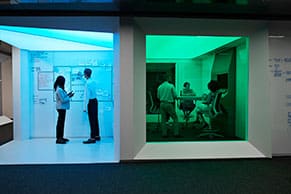Hundreds of thousands of companies worldwide use enterprise resource planning (ERP) systems to help drive better visibility and automation into their financial and business operations. ERP systems are an integrated suite of applications that bring finance and accounting together with other areas, such as sales and customer relationship management (CRM), inventory and warehouse operations, order processing and fulfillment, project management and service delivery. Companies that deploy an ERP system instead of disparate and siloed business applications can streamline operations and improve their end-to-end visibility into finances and critical processes. As a result, ERP solutions enable company stakeholders to make better decisions and act more quickly.
What Companies Use ERP Systems?
From manufacturing to consulting, retail to software development, ERP systems help companies in almost any industry streamline business processes and make data-driven decisions about everything from inventory management to human capital management. The unifying driver across all ERP implementations is sound accounting and financial management. ERP solutions serve as the system of record for companies that run multiple subsidiaries in many different geographies, each with its own currency and regulatory requirements. But a flexible ERP system also provides tailored modules and functionalities for companies based on their industry and most pressing operational needs. So, a manufacturer would likely have an ERP system that supports lean manufacturing and delivers strong inventory management and supply chain capabilities. A consulting firm or financial services provider, meanwhile, would choose an ERP solution with solid professional services automation and project and resource management capabilities.
Key Takeaways
- Enterprise resource planning (ERP) systems are used by companies of all sizes operating in different industries worldwide.
- Regardless of industry, ERP systems provide companies with strong financial and accounting reporting capabilities, along with automation of accounts payable, invoicing and fixed-asset management.
- Many global companies use ERP solutions to provide a unified view of project status, inventory, finances and business processes across multiple subsidiaries and geographies.
- Companies in industries such as manufacturing, retail, wholesale distribution and transportation and logistics leverage ERP technology for highly effective inventory management and supply chain optimization.
- Companies in such industries as consulting, IT services and financial services use ERP to better manage their knowledge workers, track projects and take advantage of professional services automation.
Companies That Benefit From Using ERP
ERP systems offer valuable advantages to companies spanning various industry verticals. The following list sheds light on how ERP effectively addresses specific industry challenges across 15 different sectors. Additionally, it provides use cases of companies in these industries that have leveraged ERP to foster growth and success within their organizations.
1. Consulting
Consulting firms can leverage ERP to establish a centralized system of record not only for financial reporting, but also to direct project management, resource management and utilization and cash flow management. ERP can also make it easier to automate mobile expense management and approval processes for consultants out in the field, as well as facilitate the sharing of business-critical documents and intellectual property. Most importantly, ERP allows consulting firms to make data-driven decisions about staffing to optimize the allocation of the right skills to the right projects, minimizing bench time for expensive knowledge workers.
Case study: Axialent(opens in new tab), an international consulting firm that manages a network of more than 200 consultants across 10 countries, uses NetSuite ERP to centralize management of its finances and projects and improve company efficiency through automation. By moving from a simple QuickBooks setup to the sophistication of multiple NetSuite ERP modules — including NetSuite OneWorld, which lets companies manage multiple subsidiaries from a single solution, and NetSuite Project Management — Axialent gained heightened visibility into finances and key operational processes. The system provides real-time project status and centralizes visibility and control over six different subsidiaries, facilitating the creation of a single shared services center that handles finances and projects worldwide.
2. Education
Educational institutions, whether universities, private schools or specialized education firms, depend on ERP systems to manage recruiting, student applications and life cycle registration services, while also maintaining control over financial systems and centralizing business processes into a unified solution. Additionally, with the right ERP system, educational institutions can effectively manage fundraising and donor relationships by automating the acceptance and tracking of one-off and recurring donations.
Case study: School of Rock(opens in new tab) is a worldwide educational firm that has leveraged the NetSuite OneWorld ERP module to help it sustainably grow. In recent years, the educational organization has expanded from 200 schools with 23,000 students to 300 schools with 54,000 students. As a result, accounting processes became more complicated and hamstrung by underpowered business and financial technology. Moving to NetSuite’s ERP solution gave School of Rock the ability to speed up its month-end process to the point where it’s closing books 32% faster, shortening the process from 28 days to nine. Next up: The firm is implementing the NetSuite Revenue Management module to help it automatically recognize revenue among its many locations and provide an audit-friendly setup for every school.
3. Financial Services
Financial services firms are expected to operate with a rigorous level of visibility into their financial and business operations, so ERP technology is an obvious fit for this industry in particular. Financial services companies lean on ERP systems to provide a robust level of control over accounting processes, as well as best-in-class reporting capabilities that help these companies stay apace with compliance auditors who watch the industry like hawks. At the same time, ERP technology gives financial services business managers real-time access to key performance indicators (KPIs), such as process efficiency, data accuracy and compliance and risk management, so they can grow their business and more effectively serve customers.
Case study: A rapidly growing alternative finance company, Avant(opens in new tab) has achieved triple-digit growth over the past decade as it has built up its loan portfolio past the $1.5 billion mark. Avant is a global business, operating in 100 countries, using 20 languages and 190 currencies. The company leverages NetSuite OneWorld to streamline financial reporting across all countries (and their associated regulatory environments), saving $120,000 per year by tailoring workflows to specific business requirements. In the process, Avant’s leadership is better able to make data-driven decisions using real-time KPIs tracked by the ERP system.
4. Healthcare and Life Sciences
The flexibility and power of an ERP system can benefit healthcare and life sciences companies as they manage processes unique to the industry. Some are called to manage complicated portfolios of raw materials and finished inventory. Others must carefully and securely handle patient management and administration. ERP systems can streamline and automate these processes while helping healthcare and life sciences firms deal with the financial reporting and CRM concerns universal to all businesses.
Case study: Aviva(opens in new tab), a prolific developer of antibody variants, operates an expansive catalog of internal product testing and products, numbering well over 650,000 units. The company uses NetSuite ERP, along with the NetSuite Inventory Management and NetSuite Fixed Assets Management modules, to orchestrate and document the composition of its inventory and record financial status along the way. Additionally, the ERP system enabled the company to meet its multisubsidiary needs for a single cloud-based system to manage finances and industry compliance following a big acquisition. Ultimately, the operational streamlining and financial visibility enabled Aviva to improve profit margins and advance its mission to research and cure cancer.
5. IT Services
IT services firms often have one foot in the professional services realm and the other in product, as the industry tends to hybridize platform-based services, consulting and recurring subscription models within their business offerings. ERP solutions provide the flexibility to help IT services firms manage logistics across an array of service offerings, such as infrastructure services, software development and integration and managed IT services. These companies can use ERP software for project management and visibility, inventory management, customer and prospect tracking and the consolidation of business software into a single platform to create more efficient processes.
Case study: Cordicate Services(opens in new tab), a value-added reseller and provider of managed IT services in the greater Philadelphia region, was able to streamline its end-to-end business processes through the extensive use of ERP capabilities. The company uses five different NetSuite modules: ERP, SuiteCommerce Advanced, Order Management, CRM and SuitePeople Payroll. Cordicate is now able to generate real-time reports on sales, customers, finances and more within minutes, versus days before moving to ERP. As a result, the company has avoided the need to hire additional back-office personnel even as it has grown, and financial leaders have access to revenue and forecasting data that has improved business planning. Additionally, NetSuite powers a client dashboard that gives business leaders a consolidated view of support cases, order history and invoicing, and also provides an online payment option.
6. Manufacturing
From production planning to inventory management, financial planning to cost optimization, ERP can help manufacturers effectively execute on advanced manufacturing principles, such as lean manufacturing and total quality management. ERP systems are well-suited to handle the complicated orchestration of supply chain management, inventory management and workflow management that’s required of modern manufacturers. This is likely why manufacturing companies lead all other industries in ERP investments. In fact, one recent study showed that manufacturers account for nearly 26% of the ERP market. Meanwhile, the financial recording and reporting offered by ERP software ensures that manufacturers can engage in effective cost management and plan for steady cash flow over time.
Case study: Recovering from a fire that destroyed its manufacturing facility in 2016, Champion Fiberglass(opens in new tab) sought a cloud-based ERP system that not only could provide sound financial reporting, but also had the capacity to add other business processes as the company rebuilt. Champion opted for NetSuite OneWorld, NetSuite SuitePeople Payroll, NetSuite Work Orders & Assemblies and NetSuite CRM to support growth that saw the company double capacity in 2020 and continues still. As part of its ERP implementation, Champion streamlined financial processes and created an online portal for customers to follow orders. Additionally, the manufacturer can now carefully track post-inventory availability of mission-critical items using the visibility provided by NetSuite’s data collection and reporting capabilities.
7. Media and Publishing
Whether the business model is traditional print publishing, broadcast, advertising or online media, media and publishing firms can leverage ERP software to build audiences, manage inventory and sales, improve order fulfillment and track a range of bundles, products and promotions. ERP technology’s financial reporting capabilities and real-time visibility also provide media firms with forecasting and business insights to adjust to shifting trends in audience behavior and advertising purchase patterns. Because many publishers must deal with a wide breadth of audience consumers and advertising customers, CRM and the sales management capabilities of CRM are particularly valuable to this industry.
Case study: Online travel and entertainment website Thrillist(opens in new tab) chose NetSuite ERP software for its customizability and time savings afforded to its finance team. In the first year of deployment, the media company increased revenue by 50% and it continues to use the financial planning tool for budgeting and forecasting across multiple business units. Additionally, Thrillist’s ecommerce subsidiary, JackThreads, uses NetSuite ERP to reconcile sales of gear, gadgets and apparel and to manage inventory. The system has also streamlined advertiser invoicing.
8. Nonprofit
The right ERP solution can help nonprofit organizations manage financial records and reporting as well as the most sophisticated for-profit enterprise, while also navigating the unique challenges faced by nonprofits. This includes automating grant management, providing specialized reporting for cash and in-kind donations that meet accounting standards and IRS regulations and automating workflow support for fundraising and donor management. Additionally, mission-centric nonprofits can benefit from project tracking and visibility when offering a range of services to specific populations or communities at large.
Case study: Boys & Girls Club of Lawrence(opens in new tab) turned to NetSuite OneWorld to help expand the reach of its programs and streamline its grant management operations. As the nonprofit organization transitioned from a single major grantor to three different major sources of grant income, it needed ERP-level accounting capabilities to carefully track and report on the way funds were used and to easily report back to grantors on their specific funds. By moving from a mishmash of disparate and duplicative accounting and business-process systems to an integrated solution, Boys & Girls Club of Lawrence was able to ditch manual spreadsheet tracking and save considerable time, money and stress by creating greater financial transparency to donors, regulators and internal stakeholders. This gives the staff more time to spend with in-person donors and community relations and less on technical and administrative headaches. The nonprofit also benefited from the NetSuite Social Impact program, which helped the organization rapidly deploy the ERP software and provided resources to quickly bring users up to speed.
9. Professional Services
Consulting and professional services firms can drive operational effectiveness and improve project profitability through the use of an effective ERP solution, particularly when it’s extended with an appropriate module for professional services automation (PSA). A recent study shows that integrating PSA into business processes can help professional services firms reap 27% higher project revenues. ERP software gives professional services leadership comprehensive and real-time views into business performance, project timelines and financial health, providing a foundation for data-driven decisions. Additionally, ERP can unify applications, such as CRM and ecommerce, to streamline administrative workflows and automate back-office work.
Case study: Supply chain management automation consulting firm Barcoding, Inc(opens in new tab). tapped NetSuite OneWorld to help overcome visibility problems presented by compartmentalized and distributed data in siloed ERP and CRM systems. The implementation enabled Barcoding, Inc. to automate its quote-to-cash cycle and establish single-pane-of-glass visibility across financial processes, business operations and CRM functions. Additionally, the company extended its use of the ERP system to include NetSuite SuiteCommerce Advance, which helped it launch an ecommerce site serving B2B customers and partners. The results speak for themselves: Barcoding, Inc. grew revenue by 200% in the first three years using the platform, and drove up order efficiency by 30% to 40%. In the meantime, customer satisfaction is also on the rise.
10. Restaurants and Hospitality
The restaurant and hospitality industry must support multiple lines of business, along with a varied crew of stakeholders, each of whom needs visibility into distinct KPIs to effectively execute on their mission. Whether they’re franchisors, restaurant enterprises, hotel chains or hospitality groups, businesses in this industry can benefit from the visibility and automation afforded by ERP technology at every effective level. A unified ERP solution makes it possible for business units to make cross-platform, data-driven decisions through role-based dashboards and reporting that taps into an ERP system’s unified pool of data. The comprehensiveness of an ERP system also helps restaurants and other hospitality companies eliminate inefficient collections of data from point solutions and applications, establishing a single system of record for financials, inventory, point-of-sale data, CRM and human capital management.
Case study: Sporting and major events company Comcast Spectator(opens in new tab) leverages NetSuite ERP along with a trio of other modules — NetSuite Fixed Assets Management, NetSuite SuiteAnalytics and NetSuite Learning Cloud Support — to run a portfolio of 15 subsidiaries. As owner of the Wells Fargo Center in Philadelphia, which hosts the company’s Philadelphia Flyers NHL team as well as the NBA’s Philadelphia 76ers, Comcast Spectator depends on its ERP system to quickly calculate monthly depreciation and help its accounting team approve journal entries in bulk. With a multifaceted slate of operations, the company also needed NetSuite to help it significantly streamline a chart of accounts that had ballooned to 27,000. In addition to financial support, Comcast Spectator is leveraging NetSuite to integrate its ticket office system and point-of-sale systems into the ERP system for greater operational efficiency and clearer visibility into financials.
11. Retail
In the omnichannel world of modern retail, ERP software helps retailers manage finances and operations across multiple brick-and-mortar store locations, as well as online marketplaces, within a single platform. Optimally, an ERP system tailored to retail can establish real-time global inventory and order management in a way that delivers a great customer experience. When done right, customers should be able to buy and return from anywhere, and a well-deployed ERP system can help deliver this functionality while creating a consistent omnichannel shopping experience. All of that will be backed by compliance-friendly financial reporting and forecasting that can help retailers plan for seasonal shifts and ad-hoc supply chain disruptions.
Case study: Known best for its brick-and-mortar presence in the Windy City, the Chicago Music Exchange(opens in new tab) is a healthy omnichannel retailer that also sells a range of products through its ecommerce site and app, as well as on Amazon and music marketplace Reverb. The company manages a robust product portfolio with over 15,000 SKUs that represent standard recordings and exclusive products developed collaboratively with artists. The retailer uses NetSuite ERP, together with the NetSuite Connector, NetSuite Financial Management and NetSuite Learning Cloud Support modules, to keep tabs on inventory and track sales across every channel. NetSuite automated processes and reduced errors in the warehouse picking process at the exchange’s 20,000-square-foot warehouse facility. The technology also sped up inventory scanning and the recording of inventory movement and automated a huge chunk of the company’s ecommerce operations. Using NetSuite Connector, the Chicago Music Exchange is able to ensure that real-time data is reflected on Reverb.
12. Software Technology Companies
A strong ERP solution can provide software and technology companies with a practical and scalable foundation on which to build their business, from startup to initial public offering (IPO) and beyond. This is likely why the information technology vertical is the second-most invested industry (behind only manufacturing) in terms of ERP deployment. A recent study shows that IT companies account for nearly 17% of the ERP market.
When done well, an ERP system can help legacy software firms transition from perpetual licensing to the recurring revenue models of software-as-a-service, providing automation of revenue recognition that’s flexible enough for both models. On the recurring revenue front, a solid ERP implementation can power term and evergreen subscription management, change-order management and contract renewal automation and also provide support for upsell and cross-sell opportunities. The net benefit is an increase in customer lifetime value and profitability. Additionally, ERP systems can deliver the maturity in financial reporting necessary to help software companies evolve — for example, providing administrative support to elevate software startups past the IPO stage or the technology to meet accounting challenges from rapid growth or an acquisition binge.
Case study: Ceridian Software, a rapidly growing global software provider, faced a unique situation following its 2018 IPO: It was running financials via two disparate ERP systems. The company turned to NetSuite OneWorld to consolidate these systems into a single, integrated solution. Ceridian migrated and consolidated 117 company codes down to 35, 3,000 departments to 850 and 250 product lines down to fewer than 50 in a massive push to improve the efficiency of its accounting operations. The result: The company has been better able to support revenue growth that broke the $1 billion mark several years ago, while offering a more detailed chart of accounts that aligns with business strategies. The next step for the software provider is to automate even more accounting processes by implementing NetSuite SuiteBilling and NetSuite Advanced Revenue Management.
13. Transportation and Logistics
ERP software can help transportation and logistics firms navigate the waters of digitized supply chain management with a unified platform that contains each piece of the supply chain puzzle. When transportation and logistics companies migrate their disparate systems, such as inventory management, warehouse management, distribution requirement planning, fixed asset management, financial management and CRM, they’re able to streamline processes and attain a synergy that improves business performance across the business. The visibility gained by an ERP system’s integrated budgeting and forecasting feeds decision-making with real-time business intelligence. This gives transportation and logistics leaders the insight to adjust to rapidly changing market conditions and maintain growth, even in the face of economic headwinds or regulatory pressures. According to a recent survey, ERP logistics modules are ranked by 62% of all businesses as one of the most important modules in their ERP system.
Case study: Transportation and logistics company Seaman’s Beverage and Logistics(opens in new tab) stores and ships $150 million in alcoholic beverages worldwide each year — all with a relatively small corps of under 100 employees. NetSuite ERP, paired with NetSuite Inventory Management, helps Seaman’s meticulously track inventory as it moves through its shipping channels and warehouses. The ERP system also helps the company keep clients compliant with industry regulations across 22 different countries. Seaman’s uses the systems to analyze metrics and adjust logistics strategies to increase profitability per case of products and save money for customers in the process. The company also leverages the system to improve the customer experience by providing views of real-time inventory levels that can inform their customers’ business decisions. The visibility keeps both Seaman’s and its customers well-informed and agile as supply chain conditions inevitably change.
14. Utilities
ERP solutions can help utilities like energy and water companies deliver their mission-critical services with optimal business efficiency and profitability. Well-executed ERP systems allow utilities to better track consumption and use of resources by customers, automate detailed invoice and billing processes that keep customers well-informed and power accurate accounting and forecasting to enable utilities to plan accurately for fluctuating resource demands. These systems also help utilities establish effective human capital management to build resilience in the face of weather events and other exigencies that could stress a utility’s ability to deliver services to customers.
Case study: Australian clean-energy provider Energy Matters(opens in new tab) uses NetSuite OneWorld and NetSuite Ecommerce to help it rapidly grow in a price-sensitive market by using ERP-powered data and automation to improve the customer experience. Prior to deploying OneWorld, Energy Matters operated with a range of fragmented business and financial software applications that made it difficult to provide timely updates to web pricing, resulting in incorrect charges for products. Additionally, the siloed application stack made it tough to answer customer questions about installation issues or complex configurations. The energy company can now update pricing instantaneously and has slashed hour-long phone calls down to 20 minutes. It also implemented a self-service portal that lets customers track shipping and installation. Most importantly, Energy Matters’ ERP solution has allowed the company to decrease average order-to-cash time by 33%, from 21 to 14 days.
15. Wholesale Distribution
Wholesale distribution companies that have struggled with information silos across supply chain, IT, manufacturing and sales can gain a huge advantage through the effective implementation of an ERP solution. The right platform can enable a wholesaler to bring all these operations together so that data from each can help inform and optimize the supply chain management process. ERP systems provide distributors with real-time access to KPIs, such as cost of goods sold and picking accuracy, and help them automate transaction flows and eliminate manual data entry and warehouse processes. Meanwhile, ERP data can help bolster ecommerce capabilities and deliver reports and dashboards to customers that can help boost sales and improve customer satisfaction.
Case study: Redcat Racing(opens in new tab), a specialty distributor of high-performance radio-controlled hobby cars, implemented NetSuite ERP, along with the NetSuite SuiteCommerce and NetSuite Site Builder modules, for financial and inventory management. The deployment was built to replace and consolidate the finance and ecommerce functionality that had once been powered by a homegrown ecommerce system and QuickBooks. The power of ERP has helped Redcat build an ecommerce juggernaut that has increased revenues by 12 times in the years since implementation. The streamlined connection between the ERP system’s inventory data and Redcat’s ecommerce site provides end-to-end, real-time inventory visibility. The ERP system’s connection to Redcat’s mobilized warehouse management software, meanwhile, gives the company full visibility into possible warehouse bottlenecks.
Choosing an ERP Solution for Your Company
As companies seek an ERP solution that’s right for their specific business needs and industry challenges, they’ll likely zero in on the consolidation and efficiency gains afforded by an ERP system’s integrated approach. Every ERP implementation is different, but there are typically five universal features: finance and accounting, CRM, human resource management, inventory management and supply chain management. Choosing the right ERP solution can be challenging — companies must carefully examine their requirements and understand how their current and future processes will be served by a particular solution’s capabilities. But the benefits are clear. With the right implementation, an ERP system can improve profitability, business agility, customer satisfaction and operational efficiency for companies of all sizes in almost any industry.
All Companies Can Use NetSuite ERP
Companies of all sizes operating in any industry can benefit from the power of NetSuite ERP. An all-in-one cloud-based business management solution, the system provides automation of processes and visibility into operational and financial performance. It’s highly extensible, with modules that address unique industry challenges, including professional services automation, inventory management, manufacturing resource planning, ecommerce and procurement. This sets up ERP as not only a system of record with impeccable data integrity and availability, but also an automated tool to optimize supply chains and distributed workforces.
NetSuite ERP is also purpose-built to meet the challenge of unifying data streams and processes for global organizations with multiple subsidiaries, business units and legal entities. It’s used in more than 200 countries, supports 27 languages and 190 currencies. Whether companies are pre-revenue startups or rapidly growing global enterprises, they can rely on NetSuite ERP to help them sustainably grow over time.
ERP systems provide all types of companies across all industries with the automation and insight they need to optimize business performance. The finance and accounting functions of ERP, combined with other application capabilities, such as CRM, inventory management and ecommerce, help companies bridge data silos and connect systems for greater operational efficiency across different business groups, subsidiaries and geographies. Additionally, ERP’s solid standing as a system of record provides reporting that simplifies regulatory compliance.
ERP Systems and Industries FAQs
What types of companies use ERP systems?
A wide range of companies around the world use ERP systems to unify their financial and business operations. This includes small, midsize and large companies operating in dozens of industries, from manufacturing to professional services.
Which companies need ERP?
Companies that struggle under siloed business systems that use error-prone and laborious manual processes to work together need ERP systems to unify data streams, provide a single source of truth to the business and automate core business processes.
How many companies use ERP systems?
Estimates vary, with some analyses showing that more than 280,000 companies use 66 different kinds of ERP systems worldwide. More than 35,000 customers have chosen Oracle NetSuite as their ERP solution.









